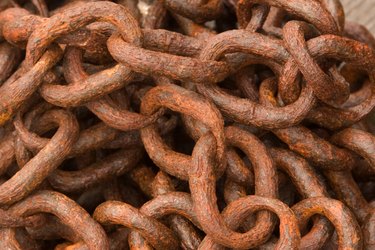Things You'll Need
Fine-grit sanding block
Assorted metal objects, such as hinges
Plastic tub or bowl
White vinegar
Salt
Newspaper
Rubber gloves or tongs (optional)
Garden hose or damp rag
Newspaper

Waiting for metal to rust on its own isn't exactly practical when working on a project -- leaving the metal outdoors to rust it may take years to achieve the desired look. Instead of playing the waiting game, force the metal to rust using chemicals designed for this purpose. This way, your craft or decor project destined for a rustic, vintage or antique look can be finished while you are still inspired to work on the project. No harsh chemicals are required for rusting metal, so there's no danger about handling objects after you remove them from their rust-inducing bath.
Step 1
Sand the metal objects gently with a fine-grit sanding block. A sanding block flexes and conforms to the shape of the metal as you work, so it handles a little more easily than sandpaper over curved shapes such as rounded keys or hinges. Sanding is optional; it simply helps remove coatings on certain metals and scuffs the metal up a bit, making the rusting process happen more quickly.
Video of the Day
Step 2
Place the metal project pieces into a plastic tub or bowl. Pour in enough vinegar to cover the pieces completely.
Step 3
Sprinkle a tablespoon or so of salt into the vinegar and swish the container around slightly to help the salt dissolve. Allow the objects to sit overnight in the solution.
Step 4
Remove the metal from the vinegar, if it looks rusty enough for your liking; if not, leave the pieces in for another day. Remove the pieces with rubber gloves or tongs if you do not want to touch the vinegar.
Step 5
Rinse the pieces off with a garden hose or wipe them off with a damp rag. Allow them to air dry on sheets of newspaper.
Tip
Experiment with different metals; some, such as steel, will rust, while others, such as brass or copper, may develop a patina.
If the object cannot be placed in a plastic bowl -- for instance, the legs on a cafe table -- soak paper towels in vinegar, sprinkle salt on the paper towels, then wrap the towels around the object, salted side on the metal. Secure the paper towels to the project with rubber bands or twine, if necessary. Mist the paper towels with more vinegar, as needed, from a spray bottle. Check the progress after a few hours by lifting the paper towel away from the object.
Video of the Day